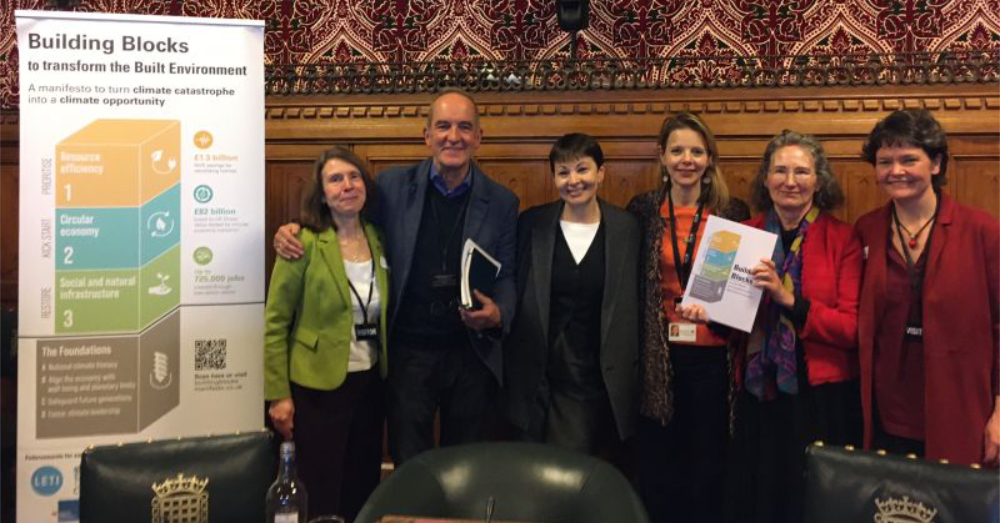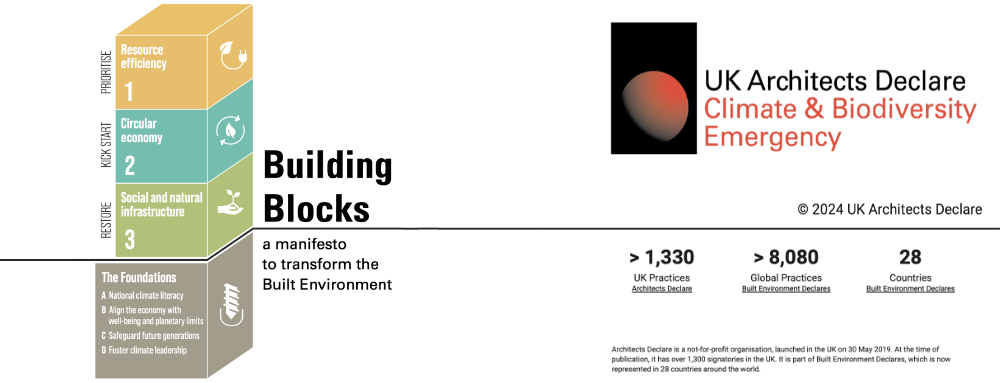Architects Declare present Building Blocks manifesto to parliament

|
| For further information regarding the information below visit Architect's Declare or Building Blocks Manifesto |
Contents |
[edit] Presentation to Parliament
In March 2024 the organisation Architects Declare, including representation from Julia Barfield MBE along with Kevin McCloud (Grand Designs) and Kate Raworth (Doughnut Economics) presented The Building Blocks manifesto at a parliamentary event, hosted and chaired by Caroline Lucas MP. The event called on the next government to commit to five critical policies in their first 100 days in office:
- Align with industry-backed Net Zero Carbon Buildings Standard reporting processes and metrics
- Legislated embodied carbon
- Provide financial incentives that prioritise retrofit & reuse
- Establish the infrastructure to allow the reuse of construction materials at scale
- Create a nationwide green jobs strategy
The proposals developed by Architects Declare and presented in the Building Blocks manifesto were developed following consultation and feedback from a wide spectrum of industry experts, the group strongly encourage parliamentarians to pledge their support for these critical built environment policies ahead of the general election.
As presented in the The Building Blocks manifesto and website policy proposals are grouped into three blocks:
- PRIORITISE Resource Efficiency
- KICKSTART the circular economy
- RESTORE Social and Natural Infrastructure
The group are asking government commit to the policies, and support these with the Foundations to enable the building blocks to succeed:
- Provide Climate Literacy at a national scale
- Align the economy with well-being and planetary limits
- Safeguard future generations ability to act
- Foster climate leadership through reforms and working with local authorities
[edit] Building Blocks: a manifesto to transform the Built Environment
The Building Blocks manifesto provides a policy framework for a regenerative built environment that enables society and nature to thrive – creating jobs, improving health, and restoring the natural world.
The manifesto is structured around three building block themes and their foundations:
[edit] 1 Prioritise resource efficiency
Radically reduce UK’s carbon emissions from the built environment by: regulating whole life carbon emissions to align with a science-based net zero trajectory; improving the efficiency of existing homes; and providing tax incentives.
[edit] 2 Kick start the circular economy
Rapidly transition to a fully circular economy through a nationwide strategy: establishing national material banks; mandating material passports; and prioritising building retention and re-use.
[edit] 3 Restore social and natural infrastructure
Use people and nature centred urban planning to build resilience and social justice; create infrastructure that supports sustainable lifestyles, green jobs and biodiversity; and restore societal and ecological health.
[edit] The Foundations
The Building Blocks must be supported by solid foundations to succeed long-term. This manifesto advocates for action in four foundational areas:
- A Provide climate literacy at a national scale.
- B Align the economy with wellbeing and planetary limits.
- C Safeguard future generations’ ability to act.
- D Foster climate leadership through reforms and working with local authorities.
This article is based on information presented on the Building Blocks Manifesto website and Architects Declare social media postings. For further information visit https://www.architectsdeclare.com/about
[edit] Related articles on Designing Buildings
- Architect.
- Architects Declare.
- Climate Change Act.
- Climate emergency.
- Climate Emergency Design Guide: How new buildings can meet UK climate change targets.
- Households Declare.
- Net zero carbon 2050.
- Net zero carbon building.
- Regenerative design.
- Structural engineers' climate action.
- The architectural profession.
- What we need for the journey to net-zero carbon emissions.
- = External resources =
Featured articles and news
Amendment to the GB Energy Bill welcomed by ECA
Move prevents nationally-owned energy company from investing in solar panels produced by modern slavery.
Gregor Harvie argues that AI is state-sanctioned theft of IP.
Heat pumps, vehicle chargers and heating appliances must be sold with smart functionality.
Experimental AI housing target help for councils
Experimental AI could help councils meet housing targets by digitising records.
New-style degrees set for reformed ARB accreditation
Following the ARB Tomorrow's Architects competency outcomes for Architects.
BSRIA Occupant Wellbeing survey BOW
Occupant satisfaction and wellbeing tool inc. physical environment, indoor facilities, functionality and accessibility.
Preserving, waterproofing and decorating buildings.
Many resources for visitors aswell as new features for members.
Using technology to empower communities
The Community data platform; capturing the DNA of a place and fostering participation, for better design.
Heat pump and wind turbine sound calculations for PDRs
MCS publish updated sound calculation standards for permitted development installations.
Homes England creates largest housing-led site in the North
Successful, 34 hectare land acquisition with the residential allocation now completed.
Scottish apprenticeship training proposals
General support although better accountability and transparency is sought.
The history of building regulations
A story of belated action in response to crisis.
Moisture, fire safety and emerging trends in living walls
How wet is your wall?
Current policy explained and newly published consultation by the UK and Welsh Governments.
British architecture 1919–39. Book review.
Conservation of listed prefabs in Moseley.
Energy industry calls for urgent reform.

























